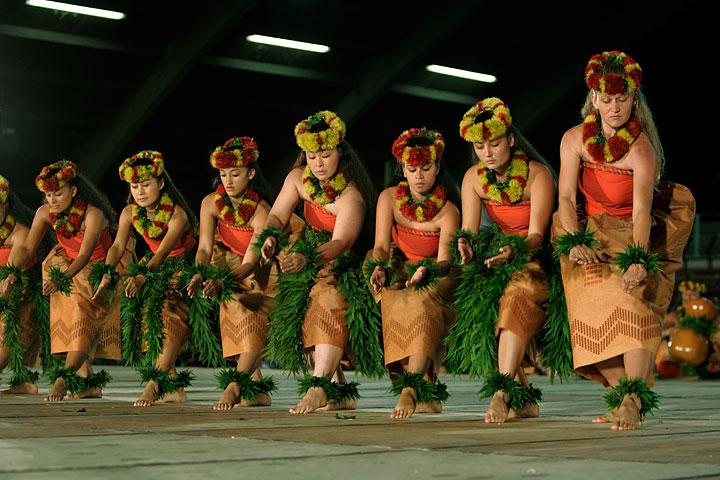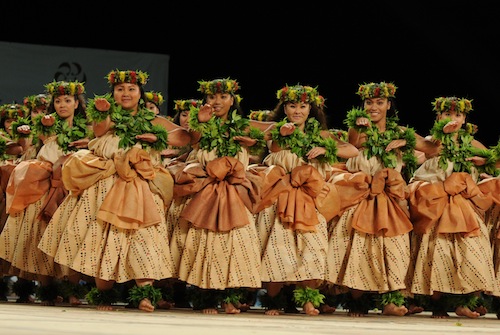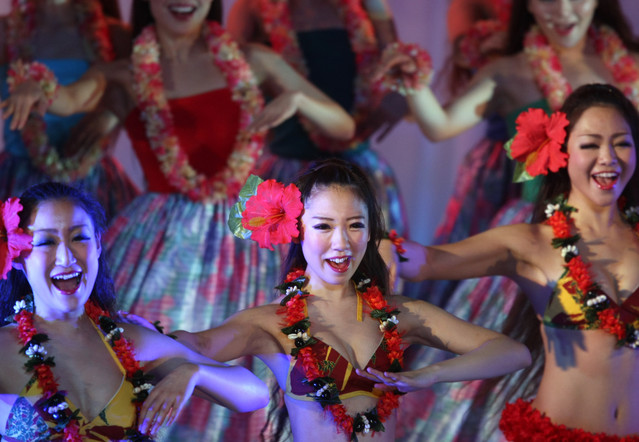The Hula Diaspora and Hawaiian Culture in Paris

Hula is an indigenous dance and way of life in the Hawaiian islands. Born in Honolulu and raised on the islands of Kaua’i, Maui and O’ahu, I’ve danced primarily auana (modern) hula for most of my life, having performed for audiences of thousands at a time. I also danced kahiko (ancient) hula when I was very young.
Taking a break from dancing for about a decade in conjunction with my recent move to Paris sparked a revived interest in the dance -- and re-enroll in Hula dance classes which I found through the France-Hawaii association with Halau Hula O Manoa. After completing the mandatory stage in September, a required three-hour course to enroll in their hula classes offered only once a year, I realized that I was connecting with the global hula diaspora. There were haole (white) teachers teaching in France and Italy, and dancers from France, Japan, Spain, Vietnam, Portugal and elsewhere just in the small group of about 30 people I encountered at the dance studio that day.
It was amazing to see people from all over the world have such a passion for something I’ve grown up doing and am ethnically and culturally tied to, yet at the same time, a bit bizarre to see people take ownership of it and boldly interpreting it as their own. All of which provoked my immediate interest in learning more about the diaspora of hula and led me to the following quesion: How is it possible to live on the other side of the planet, meet people that have a life molding passion for Hawaiian culture and yet have no or sparse genealogical ties to it? To circulate around question, I believe it necessary to review the historical evolutions of hula leading up to today’s context.
Hula’s history is one that has withstood much discrimination and oppression by missionaries and western rule from the United States, pushing hula and native Hawaiian culture to the dark corners of local society in the 1800s. CulturalSurvival.org presents arguments more cynical towards the colonial history between the U.S and Hawai’i when citing examples of native people suffering from “all the familiar horrors of contact… (including) massive depopulation, landlessness, christianization, economic and political marginalization, institutionalization in the military and the prisons, poor health and educational profiles (and) increasing diaspora”.
The organization also sheds light on the sexualized commodification of the “hula girl”, one the was created in the 20th century by the tourist industry and Hollywood films, is the form of hula that most experience as a tourist or even as a local dancer to a foreign audience. Opinions forming CulturalSurvival.org believe that the “latest affliction of corporate tourism has meant a particularly insidious form of cultural prostitution” presenting hula, “an ancient form of dance with deep spiritual meaning”, as an example of something now “made ornamental, a form of exotica for the gaping tourist”, one that is “(f)ar from encouraging a cultural revival, as tourist industry apologists contend, tourism has appropriated and cheapened (the) dance, music, language, and people, and particularly …women.”
As Anne-Kristine Tischendorf writes in her article, Hula: Past and Present, Local and Global, she quotes a student in Tromsø after taking her first hula class when asked "Does hula make you a nicer person?!" Tischendorf said that student told her that “(s)he felt more balanced and happy about herself after having done the hula moves” and Tischendorf explained that “hula can do more than this” in respect to enhancing ones life. After reading this I couldn’t help but relate hula to the diaspora of yoga and the westernization of its inherently sacred and exclusive practice to the self-actualization adaptative practice for western users.
However, despite the negative colonial history with Christian missionaries and the United States, Hawaiian-born Dr. Angeline Shaka, who specializes in twentieth- and twenty-first century hula productions and hula traditions since the Hawaiian cultural renaissance, states that “hula remains a vibrant celebration of Kanaka Maoli (Native Hawaiian) history and identity.” The native Hawaiian cultural renaissance took place especially in the 1960s and 1970s. Hawaii History.org believes the growing cultural awareness and subsequent pride amongst Hawaiians produced “political activism seeking greater autonomy and sovereignty, protection of traditional native gathering rights, and an end to the bombing of Kaho‘olawe island for (U.S.) military training purposes.” Some argue that this renaissance marked a turning point for Hawaiian culture and hula in particular by “initiating multiple cultural and political efforts aimed at reclaiming Native Hawaiian sovereignty and self-determination”, one that reached across oceans, cultures, time and space to now becoming the diaspora that we encounter today.
Mahalo nui loa na ho'olaule'a me la kauaShaka completes her review, titled Hula, in the Dance Heritage Coalition by presenting two famous Hawaiian proverbs both of which I found useful in making sense of this encounter. The first is Nānā I Ke Kumu which means to look to the source or, more specifically, to look to “the protocols and lessons imparted by one’s kumu hula (hula teacher), and to keep sight of one’s genealogical - human and divine - roots”. The second is A’ohe pau I ke ‘ike I ka hālau ho’okāhi which means that all knowledge is not taught in the same school and “reminds us that there are many valid sources of knowledge.” Shaka goes on to explain that hula is an art form that has and will always evolve to a changing world and that the Hawaiian diaspora will continue to grow. The task at hand for those who teach, dance, and view hula must understand their kuleana (responsibility) in remembering “the lessons of Hawai’i’s past while translating these lessons for future generations”.
I agree with her. In a world evolving faster than ever, hula, and I’m sure possibly every culture and cultural expression, will be touched by modern translation of its original form. However, we should rejoice in the fact that we are able to look to both our human and divine roots as well take the opportunity to learn from many sources, as long as the lessons of the past are learned and perpetuated for generations to come. I believe this framework to be applicable to any culture in this global context and am thankful for the opportunity to continue learning about my culture even when living on the other side of the world. Taking the opportunity to move through cultural boundaries and historical tensions is something I believe to be demanded from a modern peoples and a required framework for constructing identity and developing sensitivity in a globalizing world.
Thank you for celebrating with us.
[Photos: Hawaii Magazine and AsiaTravelToday.com]









